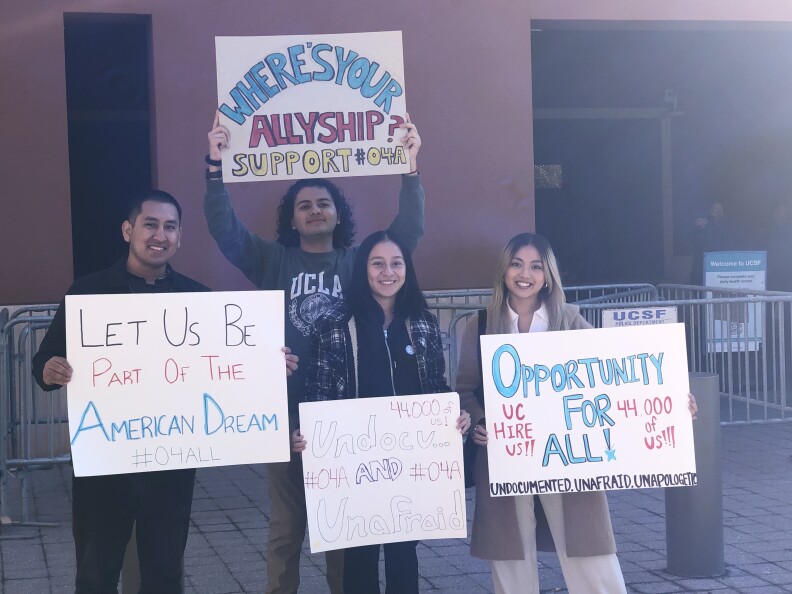Jobs
Students who are undocumented sue University of California over campus jobs policy

A political movement representing students who are undocumented filed a lawsuit against the University of California on Tuesday, alleging the university discriminated against students who don’t have legal authorization to be in the U.S.
The University of California, a public system, allows people who are undocumented to enroll, and California opens state financial aid to such students. But those students cannot work on campus.
Plaintiffs say the lawsuit is about helping pay for college and opening educational opportunities that other college students take advantage of through work in academic departments.
“In several instances that severely limited my ability to [keep] myself enrolled in the university, as well as, at some point [it] affected my ability to also obtain the full breadth of the education that I could have received from The University of California,” said Jeffry Umaña Muñoz, a former UCLA student. He’s now a graduate student at California State University, Los Angeles, and undocumented.
The lawsuit is a high-stakes escalation of the confrontation between college students and state leaders. In January, University of California leaders rejected a proposal to make campus jobs available to students who are undocumented. And in September, Gov. Gavin Newsom vetoed a state bill to do the same.
Student Karely Amaya, center, organizes an “opportunity for all” activism group at UCSF Mission Bay Conference Center in San Francisco on Jan. 25, 2024.
Loren Elliott
/
CalMatters
)
Newsom suggested the courts weigh in using an option known as “declaratory relief,” but legal experts say that’s not actually a viable option. That leaves few options for students seeking a solution.
The lawsuit’s allegations
The lawsuit alleges the University of California regents, the system’s governing body, discriminated against these students by violating the state’s Fair Employment and Housing Act.
California’s Fair Employment and Housing Act requires equal treatment of people by public agencies in employment matters, “unless there’s clear and convincing evidence that federal law requires differential treatment,” said Ahilan Arulanantham, a professor of immigration law at UCLA who helped file the lawsuit.
Arulanantham led legal research later supported by scholars across the country that argues the text of federal immigration law prohibits private employers and federal agencies from opening jobs to people who are undocumented but does not say state agencies cannot do it.
It’s a common practice across the country for state and municipal agencies to deny jobs to people who are undocumented, but Arulanantham’s novel research turns the reasoning behind that practice on its head.
Ryan King, a spokesperson for the University of California, said the university has not yet been served with the filing, but “will respond as appropriate” when that changes.
Why does UC oppose opening up campus jobs?
Arulanantham, along with a group called Undocumented Student-Led Network, have pushed leaders to create a policy to open the jobs.
In April 2023, UC Regents voted to create a policy to do so. In January, UC President Michael Drake convinced the UC Regents to stop the policy from being implemented. Drake argued it would have opened UC employees to legal liability if the federal government decided to challenge the policy.

Members of the Undocumented Student-Led Network rally at a U.C. Regents meeting.
Courtesy Center for Immigration Law and Policy, UCLA
)
“If the policy that [UC Regents] have set is a product of a misunderstanding of the law, then you can sue in order to get them to clarify, for a court to clarify what the law is and then they can reset the policy with the proper understanding of the law,” Arulanantham said.
California has more than 80,000 students who are undocumented, and campus jobs can help them pay for college, as well as open educational opportunities in their field of study.
The legal interpretation of federal law has a wide reach — a successful change could lead to policy changes not just at UC but the California State University and California Community Colleges systems, as well as other state and municipal agencies.
“I find the strength to engage in this campaign… from the hope that there is still something better yet to come for me,” said Umaña Muñoz, “from the idea that I have done what has been expected of me, that our immigrant communities, other immigrant youth like myself every day pour ourselves into our educational institutions.”






.jpg)


